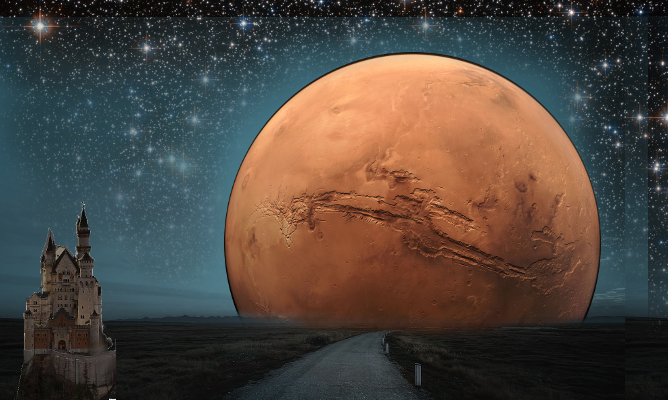

Space has a endless supply of scarce and needed metals, minerals and energy. Political and commercial entities interest is rapidly growing. In reference to mining space Neil deGrasse Tyson says space ventures will spawn the first trillionaires. Since the early days of human existance and our spieces could see the skies they have dreamth of traveling to the heavens. In 1865 Jules Vern book "From the Earth to the Moon" Was science fiction, just a dream with what most thought had impossible obstacles.
Can I sell you property on the moon? My real estate license is issued by and is good within the state of New Jersey. Therefore I am granted permission by the State of New Jersey to handle real estate transactions within the state. Since the is no Moon real estate commission, if I could locate a private owner of property on the moon I suppose I could handle your transaction. However according to the treaty of 1965 there is no private property on the moon, nor on mars as I explain in the following paragraphs. This is about to lead to problems when multiple country wish to mine the same spot.
So who owns space? Can a buy a piece of it? Technically if you own property on earth you own property in space. For the purposes of this discussion I am referring to space beyond the earth. Historically there has been kings or rulers that have granted a subject the moon. A symbolic gesture since there was no means to travel to the moon or have that grant recognize by any other country.
The Outer Space Treaty, which was signed by 112 countries in 1967, establishes that space is a global commons and belongs to all humanity, meaning that no single country or entity can claim sovereignty over space or any celestial body, including the Moon and other planets. It should be noted that That treaty was written when the cost of space travel was prohibitive, prior to anybody thinking that private industry could afford to colonize and, or mine space.
However, the Outer Space Treaty does not prohibit commercial activities such as mining in space. Some countries and companies are exploring the possibility of mining resources such as water, minerals, and rare metals from asteroids or the Moon.
The legal status of mining in space is not entirely clear, but it is generally understood that any extracted resources would be subject to the laws and regulations of the entity that extracted them. Some legal experts argue that international law, including the Outer Space Treaty, applies to mining activities in space, while others believe that a new legal framework is needed to govern such activities.
One potential concern is that mining activities in space could lead to conflicts over resources and raise questions about the equitable distribution of benefits. To address these issues, some experts have called for the development of an international framework to govern mining activities in space and ensure that they are conducted in a responsible and sustainable manner.
Treaty on Principles Governing the Activities of States in the Exploration and Use of Outer Space, including the Moon and Other Celestial Bodies Adopted by the General Assembly in its resolution 2222 (XXI), opened for signature on 27 January 1967, entered into force on 10 October 1967
Agreement on the Rescue of Astronauts, the Return of Astronauts and the Return of Objects Launched into Outer Space Adopted by the General Assembly in its resolution 2345 (XXII), opened for signature on 22 April 1968, entered into force on 3 December 1968
Convention on International Liability for Damage Caused by Space Objects Adopted by the General Assembly in its resolution 2777 (XXVI), opened for signature on 29 March 1972, entered into force on 1 September 1972
Convention on Registration of Objects Launched into Outer Space Adopted by the General Assembly in its resolution 3235 (XXIX), opened for signature on 14 January 1975, entered into force on 15 September 1976
Agreement Governing the Activities of States on the Moon and Other Celestial Bodies Adopted by the General Assembly in its resolution 34/68, opened for signature on 18 December 1979, entered into force on 11 July 1984.
The first three articles of the treaty set general principles for the use of space; the rest of the articles are intended to guide the behavior of treaty parties.
Article I The exploration and use of outer space, including the moon and other celestial bodies, shall be carried out for the benefit and in the interests of all countries, irrespective of their degree of economic or scientific development, and shall be the province of all mankind.
Outer space, including the moon and other celestial bodies, shall be free for exploration and use by all States without discrimination of any kind, on a basis of equality and in accordance with international law, and there shall be free access to all areas of celestial bodies.
There shall be freedom of scientific investigation in outer space, including the moon and other celestial bodies, and States shall facilitate and encourage international co-operation in such investigation.
The moon and other celestial bodies shall be used by all States Parties to the Treaty exclusively for peaceful purposes. The establishment of military bases, installations and fortifications, the testing of any type of weapons and the conduct of military manoeuvres on celestial bodies shall be forbidden. The use of military personnel for scientific research or for any other peaceful purposes shall not be prohibited. The use of any equipment or facility necessary for peaceful exploration of the moon and other celestial bodies shall also not be prohibited.
Article IX
International Court of Justice...
General Assembly ...
The 1979 Moon Agreement, which has been ratified by only a small number of countries, expands on the Outer Space Treaty by specifically prohibiting military activities on the Moon and other celestial bodies. The 1979 Moon Agreement, which has been ratified by only a small number of countries, expands on the Outer Space Treaty by specifically prohibiting military activities on the Moon and other celestial bodies.
Additionally, the 1984 UN General Assembly resolution on the Prevention of an Arms Race in Outer Space (PAROS) calls for the prevention of an arms race in space and the use of space for peaceful purposes. While the resolution is not legally binding, it reflects the international community's commitment to maintaining space as a peaceful domain.
Despite these agreements, there have been concerns about the militarization of space in recent years, particularly with the development of anti-satellite weapons and other technologies that could be used for military purposes in space. However, the international community continues to work towards preventing the weaponization of space and maintaining it as a peaceful domain for the benefit of all humanity.
https://www.sciencealert.com/who-owns-space-us-asteroid-mining-act-is-dangerous-and-potentially-illegal "" An event of cosmic proportions occurred on 18 November when the US congress passed the Space Act of 2015 into law. The legislation will give US space firms the rights to own and sell natural resources they mine from bodies in space, including asteroids. Although the act, passed with bipartisan support, still requires President Obama's signature, it is already the most significant salvo that has been fired in the ideological battle over ownership of the cosmos. It goes against a number of treaties and international customary law which already apply to the entire Universe. ""
https://congress.gov/114/plaws/publ90/PLAW-114publ90.pdf "—SPURRING PRIVATE AEROSPACE COMPETITIVENESS AND ENTREPRENEURSHIP "
Many other countries will follow the USA's lead and write their own space mining laws. I am told that both Russia and China have both weaponized. Thus the question, Will we be fighting for resources?
The following is a partial list of would be asteroid mining companies. If you are looking at this list for possible investment opportunity. I am not giving investment advise. Invest at your own risk. Research the company thoroughly. This is a new technology, therefore there may be very great returns upon your investment, however you might lose your entire investment.
There are still many questions to answer. Who owns an asteroid? or the moon? What happens if multiple countries and companies wish to mine the same real estate? What happens if a company is responsible for pieces of an asteroid entering the same orbit as satellites, and damages satellites?
Diamonds are valuable because the owner of the mining companies keep them rare. What happens to the price of rare earth metals, such as: gold, palladium, platinum and water if space mining is successful and they are no longer rare?
This does not include foreign governments
Mining Companies: https://www.transastra.com/Blue Origin/Amazon CEO Jeff Bezos recently announced plans to extract water from the moon. This allows for greater access to hydrogen, carbon, silicon, metals,...

